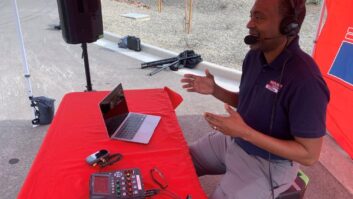ATLANTA Working as on-site engineer for Learfield Sports in 1991, Gary Kline had the task of wiring Indiana University head basketball coach Bobby Knight for an interview. Sounds simple enough, until one considers that Knight had just emerged from the shower and was in a state of undress.
Kline was faced with attaching a wireless microphone to a naked and famously ill-tempered basketball coach.
“I’m standing there with the lavaliere microphone, and we have just moments before we go live for his talk show, and he’s all wet.”
So Kline had to get creative. As the coach sat down in a chair, the engineer gingerly rested the mic on Knight’s ample stomach.
“By that time he had thrown on a pair of pants, at least,” Kline said, laughing.
While he doesn’t count the Knight incident as a career highlight, Kline said it’s a good example of how engineers are expected to think on their feet.
Engineering destiny
Kline has improvised his way to the post of corporate director of engineering for Cumulus Broadcasting, where he oversees technical aspects of operations at the group’s approximately 260 radio stations in 60 markets.
“Ultimately, my responsibility is to keep our stations on the air. I do it with the help of a great engineering staff at the station clusters,” Kline said.
Kline, 37, was born and raised in Queens, N.Y. Early on he seemed destined to become a broadcast engineer.
“I played with electronics and took apart radios at my grandparents’ house as a kid. As I got older I could actually put them back together. They were happy about that,” he said.
Kline played with an old Teac reel-to-reel deck his father owned. He even put together a mock demo tape on 8-track tape. Then he was told about a ham radio club at the Hall of Science in New York. Kline joined at the age of 12.
“That’s where I started to learn about current, voltage and tubes in a radio. That really formalized my beginnings in electronics.”
Kline got his first glimpse of a radio station at age 14 or so when he called a New York radio station to report signal interference.
“I called WYNY(FM) and told them there was classical music in the background. Their chief engineer called me back a few days later and said they had discovered bleed-over from an STL. He thanked me for pointing out the problem and invited me for a station visit,” Kline said.
After seeing radio studios for the first time in his life, he was hooked.
During the summers of his sophomore and junior years in high school, Kline received National Science Foundation grants to attend college.
“I spent seven weeks in the summer of 1980 studying digital and analog electronics with college professors at Ball State University and got college credit for it,” Kline said.
The next summer he was invited to study solar-energy engineering at the University of Colorado at Boulder. Kline says the summer studies gave him an advantage when he graduated high school in 1982.
“I don’t know if I would go through all of that again, because it was a lot of work; but I’m glad I did. I had a great deal of electronics experience already under my belt going to college.”
Business aspirations
Kline chose to attend Purdue University in West Lafayette, Ind., in part because of its electrical engineering program. But he heeded the advice of his father when selecting a major.
“My father was a civil engineer, and he always told me, ‘Gary, go into business. Be the guy who tells the engineers what to do.’ So I chose business as my major,” Kline said.
Kline worked for Purdue University radio station WBAA(AM) his first year. He announced and learned about equipment by watching the station’s veteran engineers.
“I also worked for my dorm’s radio station. Each dorm had its own radio station with turntables, a cable modulator and maybe a couple of cart decks …whatever they could scrounge up to work. I eventually became program director for my dorm’s student-run WLAY. I loved it.”
His first professional radio experience came at what was then WXUS(FM) in Lafayette, Ind. “I worked the midnight-to-9 a.m. shift Sunday mornings. And yes, that included running ‘Powerline,'” Kline said, referring to the long-running Christian radio program from the Southern Baptist Convention Media Technology Group.
Before graduating with a degree in business management in 1991, Kline had helped build radio stations in Indianapolis and worked several summers as a vacation relief engineer for NBC Radio and ABC Radio in New York.
“My schedule during school was incredibly busy. I was so immersed in radio … I was also working on several projects in Colorado. It slowed my schooling down, and didn’t help my grades all that much, either,” Kline said.
He joined University Broadcasting while in school and went to work full-time for the Indianapolis-based broadcaster upon graduation.
“The day after I graduated, I was in a car on my way to Fort Collins, Colo., to build some studios as the group’s director of engineering,” Kline said.
The company, now known as Artistic Media Partners, owned stations in Colorado and Indiana.
Kline especially liked the opportunity to travel.
“I still think the travel is the best part of my job at Cumulus. That’s good, because I’m on the road just about every day,” he said.
The engineer left Artistic Media Partners in 1994 to work for a real-estate development company as business manager, only to rejoin the broadcaster in 1998 as group technical director after missing radio badly.
In 1999, Kline received an e-mail from Terry Baun, then director of engineering for Cumulus. It would set his ensuing career path. It’s a message Kline still saves on his computer.
In part Baun wrote, “We are thinking about hiring another corporate-level person, perhaps to plan and manage build-outs/consolidations and perhaps be our processing guru. Any interest there?”
Kline said he was immediately intrigued. “It felt as if I was working myself to death … building new studios while working around the clock with very little help. I was ready for a change.”
Broad task
The Cumulus Broadcasting job offered plenty of opportunity for travel. The company owned more than 300 radio stations before a series of investor lawsuits in early 2000 forced it to sell off some assets. The Atlanta-based Cumulus now has 260 stations in 60 mid-size and smaller U.S. media markets.
Kline joined Cumulus in the fall of 1999 and originally did a lot of automation system installs and audio processing for its stations.
He officially became corporate director of engineering for Cumulus in January of this year. He had been acting in that capacity and running his own consulting engineering company since Baun’s departure in October of 2000.
Kline is responsible for day-to-day technical and special project expenditures and reports to Cumulus Media Inc. Executive Vice President John Dickey.
“I don’t have a large staff like a few of the other group engineering directors do. So I have to get out and do most of the travel myself. I’m usually on the road from Sunday night through Friday night,” Kline said.
“I still get a kick out of visiting radio stations and seeing what their studios and transmitter facilities are like. And believe it or not, even though I enjoy the new studios we build, I am especially fond of older studios that remind me of the ’80s,” he said.
Kline said Cumulus has seven regional directors of engineering who are responsible for their own stations and typically stations in several neighboring states. In total, Cumulus has 60 to 70 engineers.
“The majority of our stations have at least one full-time engineer. Many of those are backed up by local contract firms,” he said.
Cumulus just completed new studios in Houston, is building a new studio complex in Harrisburg, Pa., and has plans for new studio facilities in Mobile, Ala.; Topeka, Kan.; and Eugene, Ore. Kline said the studio projects will be digital facilities with digital consoles. However, he said the company has not standardized on consoles or other critical studio components for buildouts.
“I like to keep an open mind for new products or other vendors. I’m always open to new concepts in design and technology.”
The fact that Cumulus owns automation software provider Broadcast Software International plays no role in his decision-making when it comes to choosing an automation system, he said. Cumulus originally announced plans to standardize its stations with BSI automation software products after acquiring the company in 1999, but later said it would move away from standardization (RW, May 8).
“We choose an automation system based on the needs of the market. That can vary. Sometimes we simply move over existing systems if it is in usable shape,” Kline said.
Planning for new studio and transmitter projects includes consideration of future conversions to in-band, on-channel digital audio broadcasting, Kline said.
“When we spec transmitters, every one we buy we consider IBOC. We make sure the transmitter has enough power for combiner loss and that we leave enough space in the buildings to allow for IBOC equipment in the future,” he said.
Kline declined to discuss specific IBOC plans for Cumulus. He said the company would have to examine each market to determine return on investment before giving IBOC the go-ahead.
“I expect you’ll see some of the bigger market groups spending money on it in the next year. Some people I know are already setting money aside for conversion. I’m just not sure when it’s going to happen for us. We’ll wait to see what the consumer radio manufacturers roll out.”
Kline is proud in particular of the Cumulus Broadcasting mission statement, which includes the following: “We strive to create the next-generation radio broadcasting enterprise, based on great people and technological excellence that will provide high-quality, local programming choices for our listeners.”
It’s the “technological excellence” part that gets Kline excited.
“That means a lot to me. I tell all of my guys that (Cumulus) takes what we do very seriously and that they recognize the contributions of the engineering department,” Kline said. “My goal is to make sure each of our markets has the best technical facilities possible.”










